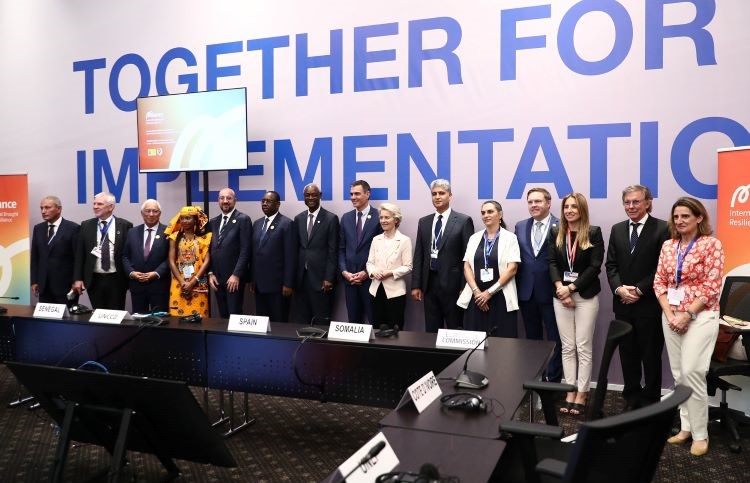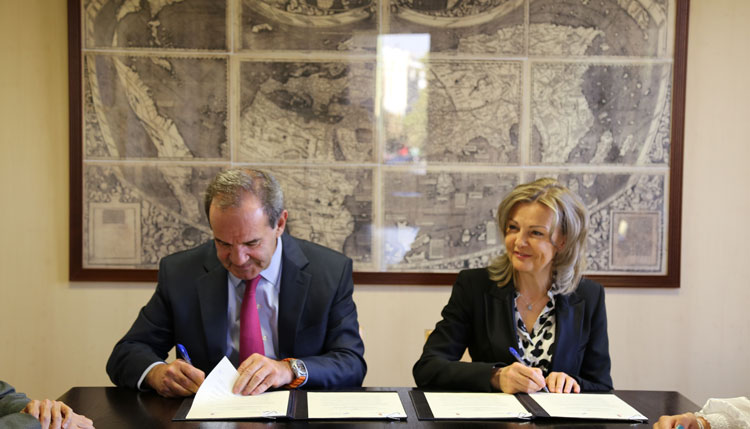The Diplomat
The Spanish government pledged yesterday, during the 27th Climate Summit (COP27), to provide up to 30 million euros to address the climate emergency. This amount includes the five million announced by the President of the Government, Pedro Sánchez, for the implementation of the International Alliance for Drought Resilience, a joint initiative of Spain and Senegal backed by the UN.
Pedro Sánchez and the Third Vice President and Minister for Ecological Transition, Teresa Ribera, participated yesterday in the Egyptian city of Sharm el Sheikh in the first day of the COP27, which will conclude on November 18.
The head of the Executive participated throughout the day in the opening ceremony, in the Plenary of the Conference, in a round table on just transition, in the Green Shipping Challenge event (convened by the United States and Norway to involve shipping in reducing greenhouse gas emissions) and in the launch of the International Alliance for Drought Resilience. In the margins of the Conference, Sánchez held bilateral meetings with the Prime Minister of Tunisia, Najla Bouden, and the King of Jordan, Abdullah II.
During his speech at the Plenary, Sánchez gave as an example of climate emergency the situation of the Doñana Park, where, “in addition to local pressures, there is the impact of unprecedented extreme droughts, the salinization of aquifers and changes in the coastline”. “The combination of all these factors threatens its very existence” and, in the face of this, “only a maximum political commitment at all levels will be able to respond to all these challenges”.
International Partnership for Drought Resilience
Pedro Sánchez’s highlight in Egypt came during his participation in the launching of the International Alliance for Drought Resilience, an initiative led by Spain together with Senegal and supported by the United Nations Convention to Combat Desertification. The objective of this Alliance is to promote innovation, technology transfer and resource mobilization in order to provide a more coordinated, collaborative and effective global response that contributes to building resilience at the local level and reducing the vulnerability of countries and communities to drought.
During the presentation, in which Sánchez and the President of Senegal, Macky Sall participated (and which was attended by leaders from more than 25 countries, as well as the President of the European Council, Charles Michel; the President of the European Commission, Ursula von der Leyen; and representatives of 20 organizations), the head of the Executive warned that “the fight against drought requires a multilateral approach and response on three fronts: political, scientific and social”. “From the scope of my responsibilities as President of the Government of Spain, what we want is to contribute to forging multilateral alliances to find solutions, and the International Alliance for Drought Resilience is one of them,” he continued.
“That is why I would like to announce that the Government of Spain is going to commit a seed capital of five million euros to boost the international drought resilience network in its first year of life,” he said. “We therefore encourage all the countries and international and European organizations that are with us to support the creation of this alliance and its resources today. We trust that new countries will continue to join us in working together towards what are already our shared goals,” he concluded. The Government of Kenya joined this initiative during Pedro Sánchez’s recent official visit to the country.
Overall, and including the five million mentioned above, the Government announced yesterday financial commitments of 30 million euros to address the climate emergency. Specifically, Spain announced three million euros for the World Meteorological Organization’s Systematic Observing Mechanism -an initiative promoted by the United Nations Secretary General-, another two million euros to the Santiago Network (created to channel technical assistance from organizations and experts to vulnerable countries) and a reinforcement of another twenty million euros of Spain’s contribution to the Adaptation Fund, an international fund to help developing countries adapt to the harmful effects of climate change.







